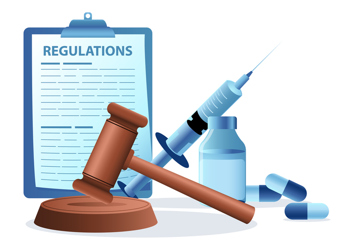Impact Of Research Misconduct Updates On Clinical Trial Sponsors
By Darshan Kulkarni, Pharm.D., MS, Esq., principal attorney, Kulkarni Law Firm, and host of Darshan Talks podcast

On October 6, 2023, the Department of Health and Human Services, in conjunction with the Office of Research Integrity (ORI), proposed updates to revise the Public Health Service Policies on research misconduct. Overall, these changes are aimed at enhancing transparency, accountability, and efficiency. However, these proposals are likely to have far-reaching implications not just for investigators and institutions but also for clinical trial sponsors.
The new proposals necessitate a comprehensive reevaluation of existing practices and policies for sponsors. These include, but are not limited to, the following:
- Accountability & Oversight: The updates emphasize institutional autonomy and thorough documentation. However, this autonomy comes at a significant price of heightened scrutiny and transparency. Sponsors who engage with sites must ensure that this independence is well deserved by ensuring that they have the appropriate standard operating procedures, training programs, and audit programs in place. Additionally, sites must ensure that they have appropriate clinical research misconduct hearing procedures to ensure fairness to the principal investigators and limited carryover effects on sponsors. Failure to do so can be catastrophic for sponsors who may be blamed not only at a regulatory level for inadequate supervision of a clinical trial but also by patients for failing to look out for patients’ best interests.
- Transparency: The newly proposed rules offer sites heightened accountability in exchange for greater independence. Unfortunately, this independence must be counter balanced and appropriately addressed by sponsors who continue to be responsible for the appropriate oversight of clinical trials. Failure by sponsors or their CRO representatives may expose sponsors to reputational risks resulting from deficient principal investigator oversight. In the event of a PI being involved in research misconduct, the media may home in not only on the PI’s deficient conduct, but also on the sponsors’ failure not only to catch such conduct but prevent it, and/or their failure to appropriately avoid PIs who may exhibit such research misconduct. While this was always a risk, the heightened transparency of proceedings, wherein final research misconduct investigation reports must be provided to ORI and such reports may be published by ORI subject to the Privacy Act and ORI’s system of records notice, does result in increased risk to sponsors.
- Legal Risks: Sponsors that engage sites that have demonstrably deficient processes will expose sponsors to legal risks for failure to inadequately supervise the clinical trial. The new guidelines clarify that federal action may be required to protect the interests of subjects involved in research misconduct proceedings. This could potentially expose sponsors to legal scrutiny.
- Data Integrity: The updates aim to modernize the guidelines to address challenges like custody and record retention timelines in the context of cloud-based storage. Sponsors generally have little control over data integrity processes at the site level and have generally depended on sites to have adequate controls in place. However, given the reputational risk, and the interest of sponsors to access investigator misconduct evidence, sponsors may need to independently ensure that site data management systems are robust and compliant.
- Timelines: A variety of timelines are imposed by the proposed regulations on sites. Timelines include when investigations must begin, when they must be completed, and when reports to ORI must be submitted. Such efforts will necessarily distract sites, and the added responsibility could result in delays for clinical trial sponsor timelines, especially if misconduct is suspected.
- Confidentiality: The new guidelines allow for broader disclosure of the identities of individuals accused of research misconduct and findings as may be found in the final investigation report, but subject to the Privacy Act and ORI’s system of records. While Clinicaltrials.gov does provide for the disclosure of some identities, sponsors will need to be cautious about how this could affect confidentiality agreements.
- Contractual Agreements: The variety of changes proposed by ORI will necessarily impact contracts with institutions and investigators. Clinical trial agreements must therefore be updated to include clauses that address the new ORI guidelines. There are a variety of changes that may result including stronger audit policies, updates to the confidentiality policy, stronger notice provisions, and more. Sites and sponsors may find it advisable retain legal experts to oversee and update their contracts.
- Financial Implications: Given the transparency of the proceedings, institutions are incentivized to take a harder stance against potential misconduct. While this will protect the interests of the sites, this may take away from the rights of PIs who may be charged with misconduct and who may feel that their interest in confidentiality, and a right to a fair trial are compromised as a result of this hardline position. PIs found guilty of misconduct will then expose sponsors to financial losses due to halted or invalidated trials.
- Public Relations: Given the radical transparency proposed by ORI and HHS, sponsors should be prepared with a public relations strategy in case they are associated with a research misconduct case, given the new public disclosure rules.
The ORI's updated guidelines on research misconduct represent a new guidepost for clinical trial sponsors. While the new landscape demands a proactive approach to compliance, transparency, and ethical conduct from sites, sponsors must respond by revisiting contractual agreements, bolstering SOPs and data review mechanisms, and more. Failing to adapt could expose sponsors to legal repercussions, financial losses, and reputational damage. Therefore, understanding and integrating these new guidelines is not just a matter of regulatory compliance but a strategic imperative for safeguarding the integrity and success of clinical trials.
About The Author:
 Darshan Kulkarni, PharmD, MS, Esq., is the principal attorney at the Kulkarni Law Firm, known for its dedication to legal excellence in the pharmaceutical industry. An entrepreneur and an innovator, Kulkarni serves as an adjunct professor at Drexel University School of Law. He serves on multiple boards including the board of the Emily Whitehead Foundation, contributing to transformative work in pediatric cancer research. Beyond his legal and academic commitments, Kulkarni hosts the DarshanTalks podcast, a platform where he engages thought leaders in candid discussions about the life sciences.
Darshan Kulkarni, PharmD, MS, Esq., is the principal attorney at the Kulkarni Law Firm, known for its dedication to legal excellence in the pharmaceutical industry. An entrepreneur and an innovator, Kulkarni serves as an adjunct professor at Drexel University School of Law. He serves on multiple boards including the board of the Emily Whitehead Foundation, contributing to transformative work in pediatric cancer research. Beyond his legal and academic commitments, Kulkarni hosts the DarshanTalks podcast, a platform where he engages thought leaders in candid discussions about the life sciences.
